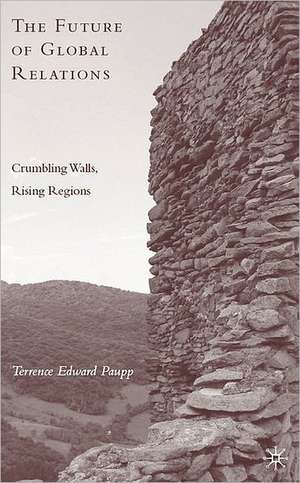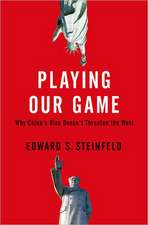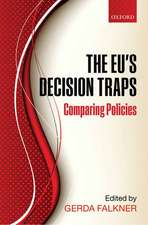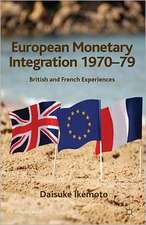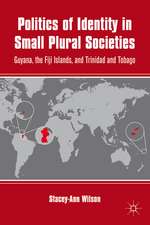The Future of Global Relations: Crumbling Walls, Rising Regions
Autor T. Pauppen Limba Engleză Hardback – 14 iul 2009
| Toate formatele și edițiile | Preț | Express |
|---|---|---|
| Paperback (1) | 387.96 lei 6-8 săpt. | |
| Palgrave Macmillan US – 14 iul 2009 | 387.96 lei 6-8 săpt. | |
| Hardback (1) | 393.52 lei 6-8 săpt. | |
| Palgrave Macmillan US – 14 iul 2009 | 393.52 lei 6-8 săpt. |
Preț: 393.52 lei
Nou
Puncte Express: 590
Preț estimativ în valută:
75.31€ • 78.33$ • 62.17£
75.31€ • 78.33$ • 62.17£
Carte tipărită la comandă
Livrare economică 14-28 aprilie
Preluare comenzi: 021 569.72.76
Specificații
ISBN-13: 9780230617476
ISBN-10: 0230617476
Pagini: 282
Ilustrații: XXI, 282 p.
Dimensiuni: 152 x 229 x 23 mm
Greutate: 0.54 kg
Ediția:2009
Editura: Palgrave Macmillan US
Colecția Palgrave Macmillan
Locul publicării:New York, United States
ISBN-10: 0230617476
Pagini: 282
Ilustrații: XXI, 282 p.
Dimensiuni: 152 x 229 x 23 mm
Greutate: 0.54 kg
Ediția:2009
Editura: Palgrave Macmillan US
Colecția Palgrave Macmillan
Locul publicării:New York, United States
Cuprins
Foreword by Richard Falk Preface Introduction PART I: AN OVERVIEW OF AMERICAN HEGEMONY: PAST, PRESENT, AND FUTURE Hegemony and its Alternatives Imperialism, Empire, Global Capitalism, and American Hegemony Hegemonic Global Capitalism versus the Universal Claims of Human Rights Law Confronting Hegemony as a Form of Social Domination Hegemonic Purposes The Unmapped and Uncharted Journey beyond American Hegemony The Paradigm of Emancipation PART II: RESISTANCE, REGIONALISM& REGIONALIZATION: COUNTER-HEGEMONIC Beginnings among Social Movements& Between Regions Competing Models to Explain American Hegemony and World Order The Unbalanced Power Projections of the American Hegemon Questions and Answers about Resistance to American Hegemony The Future of World Order& the 'Principle of Hegemonic State Accountability' (PHSA) Alternative Models to Superpower Hegemony Conclusion:The Rise of Regional Orders in the Emerging Post-Hegemonic Era
Recenzii
"A sober reckoning of the overall situation makes the outlook for the human future bleak and catastrophe-prone. Against such a background of dismal conjecture, this remarkable book by Terrence Paupp is little short of an intellectual miracle." - From the Foreword by Richard Falk
"In The Future of Global Relations, Terry Paupp provides a compelling analysis of the decline of American hegemonism and the rise of a new international order dominated by multiple centers of power. The book is especially valuable in describing the new landscape of regional organizations and alliances that are playing an ever more significant role in world affairs, and in identifying the more pluralistic norms and values that must characterize international behavior a world of multiple, interdependent actors." - Michael Klare, Five College Professor, Hampshire College, Amherst
"This is a masterful work that should be distributed widely. Anyone addressing possible future world orders should start by considering Paupp's descriptions and prescriptions." - Brian J. Foley, Visiting Associate Professor, Boston University School of Law
"My first reaction to Paupp's book was "WOW". He has looked at the terrifying situation in which we live directly and squarely without flinching." - Marc Raskin, Co-founder of the Institute for Policy Studies and Professor in the Stephon Joel Trachtenberg School of Public Policy and Public Administration of George Washington University
<"Paupp gets it right in this book. The American Century of unipolar control is over. The cost, the arrogance, and the rise of regional "multi-polar" powers are fast replacing the post-WWII U.S. strategy of confrontation and domination. President Obama should read this book as he tries to fix the collapsing U.S. economy.Paupp clearly suggests that continued military "hegemony" is not sustainable. Better Obama join the growing cooperative global mood by converting U.S. military production to technologies like rail, wind, and solar that will help deal with the coming harsh reality of climate change. Anyone who wonders where the world is heading should read this book." - Bruce K. Gagnon, Global Network Against Weapons & Nuclear Power in Space
"In The Future of Global Relations, Terry Paupp provides a compelling analysis of the decline of American hegemonism and the rise of a new international order dominated by multiple centers of power. The book is especially valuable in describing the new landscape of regional organizations and alliances that are playing an ever more significant role in world affairs, and in identifying the more pluralistic norms and values that must characterize international behavior a world of multiple, interdependent actors." - Michael Klare, Five College Professor, Hampshire College, Amherst
"This is a masterful work that should be distributed widely. Anyone addressing possible future world orders should start by considering Paupp's descriptions and prescriptions." - Brian J. Foley, Visiting Associate Professor, Boston University School of Law
"My first reaction to Paupp's book was "WOW". He has looked at the terrifying situation in which we live directly and squarely without flinching." - Marc Raskin, Co-founder of the Institute for Policy Studies and Professor in the Stephon Joel Trachtenberg School of Public Policy and Public Administration of George Washington University
<"Paupp gets it right in this book. The American Century of unipolar control is over. The cost, the arrogance, and the rise of regional "multi-polar" powers are fast replacing the post-WWII U.S. strategy of confrontation and domination. President Obama should read this book as he tries to fix the collapsing U.S. economy.Paupp clearly suggests that continued military "hegemony" is not sustainable. Better Obama join the growing cooperative global mood by converting U.S. military production to technologies like rail, wind, and solar that will help deal with the coming harsh reality of climate change. Anyone who wonders where the world is heading should read this book." - Bruce K. Gagnon, Global Network Against Weapons & Nuclear Power in Space
Notă biografică
TERRENCE EDWARD PAUPP is Senior Research Associate at the Council on Hemispheric Affairs (COHA), Washington, D.C., USA and Vice President of North America for the International Association of Educators for World Peace (IAEWP).
